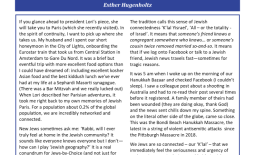Re-writing and Writing a Torah of Inclusivity
This piece was written for our New Member Shabbat.
When I scout out the Torah portion for the week, I must admit that I quietly profess faith that the Parashah will render unto me some deeper insight that meets the moment. This naïve faith of mine, bordering on superstition, rarely lets me down – a phenomenon that one could term ‘confirmation bias’, although I do believe the Rabbis were very intentional in how the set the portions in alignment with the Jewish calendar and our seasons.
This naïve faith of mine has especially been bolstered during moments of crisis, of which we have had (and undoubtedly will continue) to have many. Opening the Chumash (print Torah in book form) weekly feels like visiting an old friend; comforting and reliable, and oddly relevant each time. I’ve marveled at the serendipity of reading the Book of Leviticus during the early days of the pandemic; a subject I’ve dedicated a number of sermons to. So, it will not surprise you to know that I was eager to see what this week’s portion – Emor – had in store for us. Surely it wouldn’t disappoint.
Well, to be truthful, it did.
You see, today is Membership Shabbat where we welcome our new members in our community. The Torah has shades of light and dark, but its ethos of audacious welcome and radical inclusivity is scattered as fiery sparks across its pages. Had Membership Shabbat been planned a week later, during Parashat Behar – of ‘liberty, liberty you shall proclaim to the land and all its inhabitants’ fame, then I would have had a lot of material. Emor, however, let me down like – as they say in England – a wet rag.
Reading through the text, it was reams and reams of prescriptions and prohibitions. It starts off with circumscribing the Priestly role, demanding not only sublime holiness – even in matters of mourning kin – but also physical perfection from the Kohanim. After that, it doesn’t get any better. In verses that would strike us as objectively cruel, the portion tells us that Kohanim who are differently-abled or who have suffered debilitating permanent injuries are no longer eligible for Priestly service. Then there is misogynist shaming of women who have a sexually active personal history; they are ineligible to marry a Priest—or suffer an even worse fate.
Like an unfortunate sequence of events bordering on the comical, the Torah then segues into purity laws and bodily emissions and the ineligibility of blemished animals for sacrifice. And as a piece de resistance, the portion ends with a cruel story of a fight erupting between a ‘half-Israelite’ (one with an Israelite mother and Egyptian father – side note here how patrilineal descent was the norm in those days!) and an Israelite. The half-Israelite blasphemes the Name of God and is then sentenced to death.
Hear o hear the ignoble ending of our horrible Torah portion. A portion brimming with ‘you must do’s’ and ‘you shall not’s’, rigid boundaries, stark hierarchies, graceless shaming, dehumanizing ‘othering’ and relentless gate-keeping. Could I offer a defense of this portion? I perhaps could. I could dig deep into its context and commentaries, scour the pages of the Talmud and Midrash. But I don’t want to. Not this time.
Right now, I want us to take a deep breath. And then learn what we can not by example, but by its opposite. There’s no denying: this is the kind of Torah that makes us feel profoundly icky, for all the right reasons.
You see, Parashat Emor is a warning and an illustration. We all know situations where this kind of restrictive policing of our identity, physicality, essence and being is both absolutely real and absolutely toxic. Some of those spaces, I daresay, can be Jewish spaces. And I am here to unequivocally call it out. When we reflect on what prevents people from crossing our threshold (virtual though it is right now), we need to be courageously honest with ourselves. Do synagogues as institutions, and their leadership – both lay and clergy – truly practice the welcome they preach? Is the notion of walking into a service in a foreign language with unusual ritual a hindrance to participation in a Jewish world where this is not likely to feel intuitive for everyone? And what of the balance of the generations? What are the concerns of each demographic and do we manage to meet them? Are we successful in living our Jewish mission out in the world, by bringing our Torah of light, love and justice to the encounter with modernity and crisis?
Those are big, huge questions and I’m afraid I’ll leave them with you as a cliffhanger. Let’s start small instead; because in the small, mundane and daily is where true change happens. All of you who joined our congregation last year, joined it from a place of bravery, compassion and vision. Joining a synagogue during a global pandemic? Building relationships on Zoom? You have defied the odds of affiliation and overcome obstacles that many of us would have deemed insurmountable only two years ago. I cannot see into your hearts, but I suspect that this process of engaging with our Judaism has in many ways felt more lonely than ever before. And still, you did it, which is a testimony to your resilient spirit and proof of the genius of the Jewish People. As we sit here to critique, deconstruct and counterbalance the toxic words of Parashat Emor, I feel gratitude: grateful to be part of a tradition that is intellectually honest enough to call even our Holy Torah out, in a way, perhaps paradoxically, truly reflects the Divine Will. More importantly, I am grateful for everyone of you who has passed through our doors; in generations past and in generations to come, but in particular during this unique historical juncture. You have professed great faith in us: in God, perhaps, and Torah, but most of all, in K’lal Yisrael, the siblinghood of Jewishness.
We welcome you, each and everyone of you. The long-timer who has been here for 40 years, the stalwart who serves day in and day out, the seeker, who moves past their own nervousness to encounter the new and strange, the intergenerational family, who does not take what their parents built for granted but builds it again for our time, the interfaith and intermarried family, where Jewish-adjacent partners and spouses offer support and deep wisdom, threading themselves into the tapestry of Judaism, the convert, who boldly enters under the wings of the Divine Presence, the B-Mitzvah student, who despite school pressures, ambivalences and dare I say, the occasional boredom, fully commits and fully shows up for the Judaism of today and tomorrow. We welcome Jews and non-Jews in all their richness; the deep roots of Ashkenazim and our culture, humor, language and food, pride in a resilient history. Jews of other ethnicities, Jews of all skin-tones, all genders, all abilities and all backgrounds. Whatever your story is, we want you to tell it and share it with us here at Agudas Achim.
Parashat Emor is wrong. It’s a model of how not to live and shape congregational life, and I am glad that we can jettison it so readily. In fact, history did it for us. The Temple was destroyed due to ‘sinat chinam’, baseless hatred, as the Jewish holiday of Lag b’Omer reminds us of. The rigors and restrictions of the Priesthood were torn down and like a Phoenix from the ashes of crisis, rose what scholars call the ‘Rabbinic Revolution’. A ‘Kohen’ was replaced with a ‘chaver’, a friend or fellow, joined in the project of a sort of sanctified democracy. The project of Rabbinic Judaism is neither perfect nor complete; but it is ours to shape, and we want all of us to shape it together.
The pandemic has ripped up the scripts and we will all learn to write new ones. As the dust settles and the mists clear, we will see what the Jewish future looks like. Be what may, I want it to be a future that we share together; each of us affirmed in our essential and fundamental dignity, bonded together in love, acceptance and celebration, covenanted to work out our differences, to face our conflicts honestly and boldly and to draw our hearts together again anew, in an ‘ahavah rabbah’, a great love.
This is the Torah portion we all hope to write at Agudas Achim. Here, my friends, is the quill and the inkwell. Welcome.



